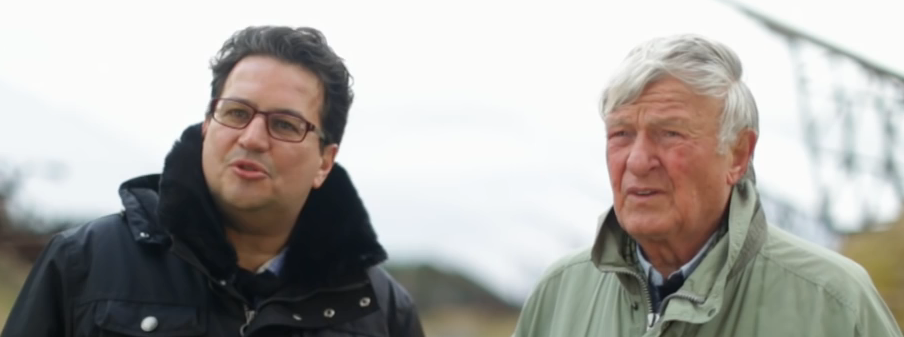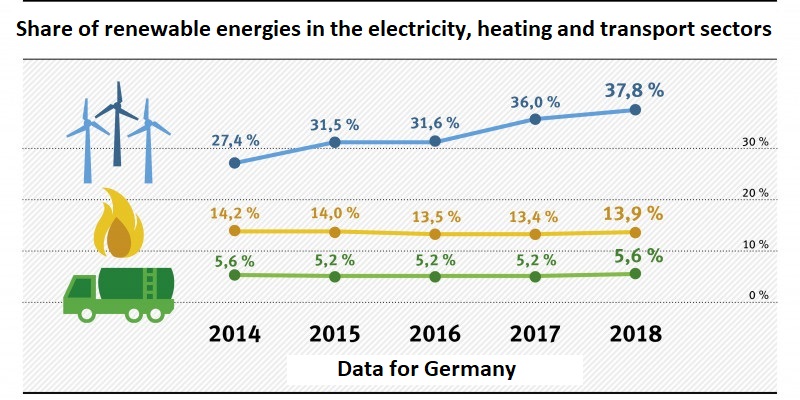Living with the energy transition TV
The sun doesn't send invoices. Living with the energy transition TV explains how we "replace" fossil energy and nuclear power.
 Film excerpts with the key sentences from life with the energy transition
Film excerpts with the key sentences from life with the energy transition
Primary Energy
- Primary energy consumption in Germany is about five times higher than electricity consumption. ∗ to the Wikipedia article
- The energy efficiency has a large influence on the primary energy consumption.
- Heating with a heat pump usually reduces the energy requirement by a factor of 3 or more.
- Generating hot water with a heat pump usually reduces the energy demand by a factor of 3 or more.
- A well-insulated house usually reduces the energy requirement by a factor of 1,5 or more compared to a less-insulated one.
- If you drive an electric vehicle, the energy requirement is usually reduced by a factor of 3 compared to a vehicle with a combustion engine.
- If the energy is transported via a distribution network, this usually increases the energy requirement by a factor of 1,2 to 3.
Presentation on the applications of hydrogen and battery technology
Findings on solar energy, cogeneration units and electricity storage
- ∗ The solar systems,
together with electricity storage, provide a significant proportion of the energy required.
- ∗ The Cogeneration Units,
operated with fossil energy and very good efficiency, can generate a great deal of electrical energy.
- In Brussels, planning for Europe-wide solar cell production will start in 2019. The Fraunhofer Institute is one of the leading institutes in this field.
- ∗ Colored solar cells
with good performance data and in-roof systems are increasingly being offered. This is good for the appearance of the places.
- Pilot project für colored solar cells as an in-roof system ∗ article at energiezukunft.eu
- PVT Collectors and heat pumps: Meanwhile, for combined solar modules with photovoltaic and heat, there are some offers. The modules call them hybrid collectors and PVT Collectors.
The offers are often together with the matching heat pumps. As advantages they praise that the collectors are silent and do not require earthworks. On the Internet we can find some reports
about well-functioning systems. We see opportunities for simpler design of in-roof PVT Collectors and for mass production.
- Solar thermal flat plate collectors achieve good values in our latitudes during 10 out of 12 months per year. Insulation is placed on the side away from the sun,
which does contribute to the roof insulation when mounted in the roof.
∗ to the German Wikipedia article
- Control of the decentralized power storage: Until today, the local storage of the house systems is only used to a limited extent to reduce power peaks and supply bottlenecks.
- With a suitable control system and a corresponding organizational model, this is conceivable in the future.
- The term "Photovoltaics PV": Experts often refer to "photovoltaic systems". This is the exact term for electricity generation from sunlight. "Solar thermal energy"
is in the professional world the production of heat. The "solar cell", on the other hand, is again a common term for electricity generation. For the sake of
understanding, we write in our articles about "solar systems".
- Proportion of electricity generation: In 2021, photovoltaic solar energy accounted for 8,7% of the electricity generated in Germany. ∗ Data from Statis.de
- Transmission losses: In the decentralized systems, the photovoltaic solar electricity is produced close to the end consumer. Thus, the transmission losses are very small. In
addition, waste heat is used in some decentralized systems for hot water and heating.
Findings on Wind Energy
- Wind energy on land: The wind turbines have been generating a lot of electrical energy for several years. The landscape is changed around the locations. In Bavaria the protection of the
population is implemented with the 10-H rule. The German Armed Forces are increasingly complaining about interference with their radar signals due to wind turbines.
∗ The development of the "Vertical Sky" is well advanced.
- Wind energy in the sea: Offshore wind turbines are anchored to the sea ground and built floating. As far as we know, the system planners expect an average power output of between
40% and 70% of the nominal power for the large wind turbines on the Atlantic. Probably the energy of the Gulf Stream unfolds its effect. In our estimation, floating wind turbines have the
potential to become the major electricity supplier of the future. Some projects are planned.
∗ article Floating wind turbine at Wikipedia.org,
∗ article Offshore Windpark at Wikipedia.org,
∗ Graphic by Wikimedia.org,
∗ Article by Welt.de
(German)
- Wind energy on the ice sheet: The wind turbines are anchored in the thick ice. There is a lot of wind on areas above the ice. A project for the Arctic has already been presented.
There is also a lot of wind in Greenland. The method of mounting the tower tube is not yet clear. The forces of the ice movements are there. The material must withstand the great cold
without becoming brittle. To prevent imbalance, the rotor surfaces are probably heated. Meanwhile, we see individual proposals for the use of wind in Grönland.
- Proportion of electricity generation: In 2021, wind energy accounted for 21,5% of the electricity generated in Germany. ∗ Data from DE-Statis
- Transmission losses: Some of the wind power generated does not reach the end consumer. Significant losses occur in the transmission of the power. These losses reduce the yield of wind power.
Findings on Long-Term Energy Storage and Seasonal Energy Storage
- For fossil energy, we have very large long-term storage facilities. The gas is produced throughout the year and transported via pipeline. In the long-term storage facility, we store the
gas for additional demand in the winter. The oil is also produced throughout the year, then transported. We hoard it in large oil storage tanks and in the individual tank of each building.
- The nuclear power plants provide constant heat and a constant amount of electricity throughout the year. Maintenance work was scheduled for the low-consumption months. According to
our knowledge, there were no systematic shutdowns of reactors in the low-consumption months. However, the heat and electricity output are sometimes reduced if the currents are too warm.
Thus, with this form of electricity production, there is usually no storage and no power control.
- Long-Term Energy Storage is an essential part of the energy transition. In winter, the energy requirement is very high. However, the solar systems and wind power do not bring the
most energy at this time of the year. The question arises accordingly: "How do we bring solar energy into the winter?"
- Water: Many reservoirs store the Energy in summer and generate the Electricity in winter.
- Hydrogen: Plants with Hydrogen Storage are already in operation as Seasonal Energy Storage in buildings.
- Methanol: We are not currently aware of any products using "Methanol" for Seasonal Energy storage in small buildings. Methanol is often used in decentralized technical systems.
- Lack of centralized energy storage: decentralized energy storage using hydrogen can be made very large. With the current state of the technique, the efficiency with decentralized
storage is better than with centralized storage, because we use the process heat useful in the building.
- The technology development of capillary electrolysis is expected to bring much higher efficiency in the conversion of water to hydrogen.
- The overall effort of the energy generation variants includes energy generation, energy transport, energy storage, and provision of the base load infrastructure. In the Variants, we
should compare this overall effort with each other.
Findings on Geothermal Energy
- Geothermal energy can provide a lot of heat energy. Many geothermal projects have already been realized in southern Germany. In the earlier times, there were earthquakes and slow movements of the
ground as a side effect in individual projects.∗ to the Wikipedia
article Geothermal Energy (German)
Findings on Energy from the Ocean
- Tidal Energy: The daily flow of water contains much energy. Tidal power plants have the property of providing the same energy every day. The flow of water is limited to the time
of low and high tide. The effect on fish is a hindrance. There are several small plants listed on Wikipedia and two large ones with about 0,25 GW. ∗ to the Wikipedia Article Tidal Power (German).
∗ to the Wikipedia Article Ocean Current Power Plant
(German)
- The Ocean thermal power plants use the temperature differences between the water surface and the depth. One known research projects are still in operation today.
∗ to the Wikipedia Article Ocean thermal energy
conversion
- Gulf Stream: The Gulf Stream is like a global conveyor belt that is always running. It carries more than one hundred times as much water as flows into the sea via all the rivers in
the world combined. The power is equivalent to one million of the large power plant units. A small part of this power should be converted into electricity.
This "would" provide mankind with enough energy.
∗ to the Wikipedia Article Gulf Stream
Possibility 1: We use the wind generated by the energy of the Gulf Stream and convert a small part of it into electrical energy with floating wind turbines. We have already described
this possibility in the section ∗ "Findings on
Wind Energy"
Possibility 2: We are building a turbine building under a natural island in the Gulf Stream area. With the help of tunnel boreholes, we then enable the continuous flow of water and use
it to generate electricity.
Colloquially, the word Gulf Stream is very well known and corresponds to the scientific term The Atlantic meridional overturning circulation (AMOC). Scientifically, the term Gulf Stream
corresponds only to a subsection of the Atlantic meridional overturning circulation. It also includes the Labrador Current, the North Atlantic Current, and several smaller currents.
More findings on Fossil and Renewable Energy
Vehicles with Fossil and Electric Propulsion
Annotation
The information on renewable energy contains significant assessments by us that are not confirmed by other public documents.
|
 Film excerpts with the key sentences from life with the energy transition
Film excerpts with the key sentences from life with the energy transition
